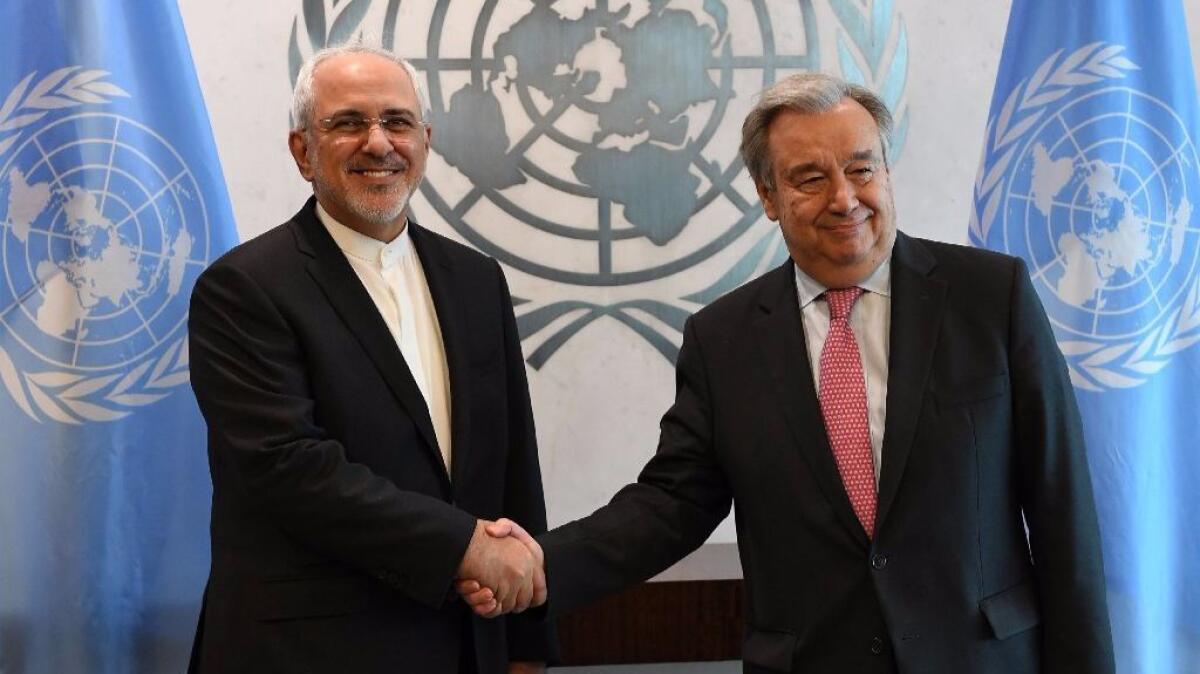After Trump reluctantly certifies Iran is obeying nuclear deal, he slaps it with new sanctions

Reporting from WASHINGTON — A day after certifying that Iran is obeying international restrictions on its nuclear program, the Trump administration went in the opposite direction Tuesday and slapped new sanctions on Tehran for unrelated alleged transgressions.
The Treasury Department blacklisted 18 people and entities for supporting Iran’s military and Islamic Revolutionary Guard, which it said harassed U.S. naval vessels and tried to build ballistic missiles and steal U.S. computer software.
The sanctions mean it is illegal for U.S. citizens or companies to do business with those on the list, and any assets they have in the U.S. can be seized. It’s unclear whether the 18 have such assets or businesses.
The back-to-back actions reflect the policy crosscurrents for President Trump in trying to reconcile his campaign promises with the realities of foreign policy governance.
As a candidate, he vowed to “rip up” the 2015 Iranian nuclear deal, which was brokered by the five permanent members of the U.N. Security Council plus Germany.
The accord required Tehran to destroy or ship out most of its nuclear fuel and infrastructure and to submit to intensive monitoring to ensure it doesn’t cheat.
In exchange, the international community agreed to ease sanctions that had crippled Iran’s economy, allowing it to again export oil and rejoin the global financial system.
The United Nations nuclear watchdog, the International Atomic Energy Agency, has repeatedly said Iran is complying with the accord. The U.S. Energy Department has offered similar assurances.
But the White House has struggled to find a way between abandoning the deal — which could allow Iran to resume nuclear development and ultimately get a bomb — and holding Tehran accountable for its development of ballistic missiles and support for militant groups in Lebanon and Yemen.
Even if Iran is complying with the nuclear accord, Tehran is violating the spirit of the deal, State Department spokeswoman Heather Nauert said Tuesday.
“Iran’s other malign activities are serving to undercut whatever ‘positive contributions’ to regional and international peace and security were intended to emerge” from the nuclear agreement, Nauert said.
The nuclear accord deliberately does not address Iran’s ballistic missile program, its support for militant groups or its human rights abuses, and the country remains under sanctions for those issues. During the negotiations, diplomats concluded it would be impossible to rein in Iran’s nuclear threat if other disputes were mixed in.
By law, the administration must report to Congress every 90 days whether it certifies that Iran remains in compliance with the nuclear deal, and the administration did so Monday before a midnight deadline.
It came with last-minute drama as Trump balked at approving certification, despite the advice of his principal national security team, according to a person close to the White House who spoke on the condition of anonymity to describe the internal debate.
After talking points for certifying Iran’s compliance already had been distributed early Monday, Trump told his top advisors he was having second thoughts and wanted other options.
Secretary of State Rex Tillerson arrived in the Oval Office about 1:30 p.m. for a previously scheduled meeting with Trump. The discussion quickly turned to the Iran deal.
Tillerson argued repeatedly that major allies were deeply invested in the deal and needed more notice before the U.S. could argue that Iran wasn’t in compliance.
Trump was upset at the notion that allies’ interests should be taken into account, and he insisted repeatedly that the accord was a “bad deal” for the United States, the person familiar with the meeting said.
Trump’s national security advisor, H.R. McMaster, and other senior advisors also made the case for leaving the deal intact.
But Stephen K. Bannon, Trump’s strategic advisor, who keeps a list of Trump’s campaign pledges on a white board in his White House office, said the president should follow through with his promise to tear up the deal.
After nearly an hour, Trump agreed to support certification, but he demanded a plan for getting tougher on Iran. Advisors were still tweaking the announcement as the midnight deadline approached.
Besides Iran’s Islamic Revolutionary Guard, the new sanctions target the military’s support of so-called fast attack boats, small vessels that Iran has used near U.S. warships in the Persian Gulf.
Most of those sanctioned Tuesday are Iranian, but one company is based in Turkey and one person is a Chinese national.
The penalties “send a strong signal that the United States cannot and will not tolerate Iran’s provocative and destabilizing behavior,” Treasury Secretary Steven T. Mnuchin said.
The State Department reissued calls for the release of U.S. citizens arrested in Iran.
For more on international affairs, follow @TracyKWilkinson on Twitter
More to Read
Sign up for Essential California
The most important California stories and recommendations in your inbox every morning.
You may occasionally receive promotional content from the Los Angeles Times.












